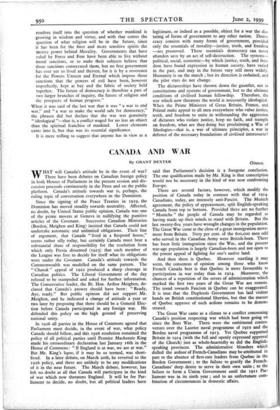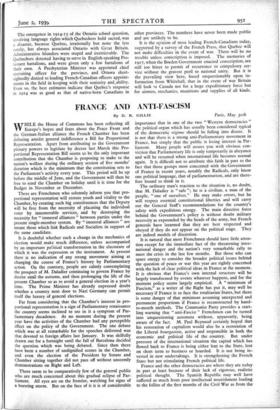CANADA AND WAR
By GRANT DEXTER
Ottawa.
WHAT will Canada's attitude be in the event of war? There have been debates on Canadian foreign policy in both Houses of Parliament in the present session and dis- cussion proceeds continuously in the Press and on the public platform. Canada's attitude towards war is, perhaps, the ruling topic of conversation everywhere in the Dominion.
Since the signing of the Peace Treaties in 1919, the Dominion has moved steadily towards neutrality. Affected, no doubt, by United States public opinion, Canada was one of the prime movers at Geneva in nullifying the punitive articles of the Covenant. Successive Canadian Ministries (Borden, Meighen and King) insisted that Canada could not undertake automatic and unlimited obligations. Their line of argument, that Canada " lived in a fireproof house," seems rather silly today, but certainly Canada must bear a substantial share of responsibility for the resolution from which only Persia dissented (1923) that each member of the League was free to decide for itself what its obligations were under the Covenant. Canada's attitude towards the Commonwealth was modelled on the same pattern. The " Chanak " appeal of 1922 produced a sharp cleavage in Canadian politics. The Liberal Government of the day refused to be stampeded and asked for further information. The Conservative leader, the Rt. Hon. Arthur Meighen, de- clared that Canada's answer should have been: " Ready, Aye, ready." But public opinion did not support Mr. Meighen, and he indicated a change of attitude a year or two later by proposing that there should be a General Elec- tion before Canada participated in any foreign war. He defended this policy on the high ground of preserving national unity.
In 1926 all parties in the House of Commons agreed that Parliament must decide, in the event of war, what policy Canada should follow, and this 1926 resolution remained the policy of all political parties until Premier Mackenzie King made his extraordinary declaration last January 16th in the House of Commons: " If England is at war, we are at war."
But Mr. King's lapse, if it may be so termed, was short- lived. In a later debate, on March zoth, he reverted to the 1926 policy, and there are unlikely to be any modifications of it in the near future. The March debate, however, has left no doubt at all that Canada will participate in the kind of war which now threatens England. It will be for Par- liament to decide, no doubt, but all political leaders have said that Parliament's decision is a foregone conclusion. The one qualification made by Mr. King is that conscription would not be necessary in the kind of war now confronting Europe.
There are several factors, however, which modify the position of Canada today in contrast with that of 1914. Canadians, today, are intensely anti-Fascist. The Munich agreement, the policy of appeasement, split English-speaking Canada from top to bottom. Provided there are no further " Munichs " the people of Canada may be regarded as having made up their minds to stand with Britain. But the last twenty-five years have wrought changes in the population. The Great War came at the close of a great immigration move- ment from Britain. Sixty per cent. of the 600,000 men odd who served in the Canadian Army were British-born. There has been little immigration since the War, and the present war-age population is largely Canadian-born and not open to the potent appeal of fighting for one's native land.
And then there is Quebec. However startling it may seem, the consensus of opinion among those who know French Canada best is that Quebec is more favourable to participation in war today than in 1914. Moreover, the chances of a repetition of the errors of administration which marked the first two years of the Great War are remote. The trend towards Fascism in Quebec can be exaggerated. It is true that the Duplessis Government has laid violent hands on British constitutional liberties, but that the masses of Quebec approve of such actions remains to be demon- strated.
The Great War came as a climax to a conflict concerning Canada's position respecting war which had been going on since the Boer War. There were the embittered contro- versies over the Laurier naval programme of 1910 and the Borden naval programme of 1913. Yet Quebec supported Britain in 1914 (with the full and openly expressed approval of the Church) just as whole-heartedly as did the English- speaking provinces. The administrative blunders which dulled the ardour of French-Canadians may be attributed in part to the absence of first-rate leaders from Quebec in the Borden Government ; to the failure to gratify the French- Canadians' deep desire to serve in their own units ; to the failure to form a Union Government until the 1911 Par- liament was in its sixth year ; and to an unfortunate com- bination of circumstances in domestic affairs. The emergence in 1914-15 of the Ontario school question, involving language rights which Quebeckers hold sacred, was a disaster, because Quebec, irrationally but none the less surely, has always associated Ontario with Great Britain. Administrative blunders were stupid and irretrievable. The Quebeckers detested having to serve in English-speaking Pro- testant battalions, and were given only a few battalions of their own. A Presbyterian Minister was appointed chief recruiting officer for the province, and Ottawa short- sightedly denied to leading French-Canadian officers appoint- ments in the field in keeping with their seniority and.ability. Even so, the best estimates indicate that Quebec's response in 1914 was as good as that of native-born Canadians in other provinces. The numbers have never been made public and are unlikely to be.
It is the opinion of most leading French-Canadians today, supported by a survey of the French Press, that Quebec will not make difficulties in the event of war. There will be no trouble unless conscription is imposed. The memories of 1917, when the Borden Government enacted conscription, are still too bitter to permit of recurrence to compulsory ser- e-ice without the gravest peril to national unity. But it is the prevailing view here, based unquestionably upon in- formation from Whitehall, that in the event of war Britain will look to Canada not for a large expeditionary force but for airmen, mechanics, munitions and supplies of all kinds.











































 Previous page
Previous page